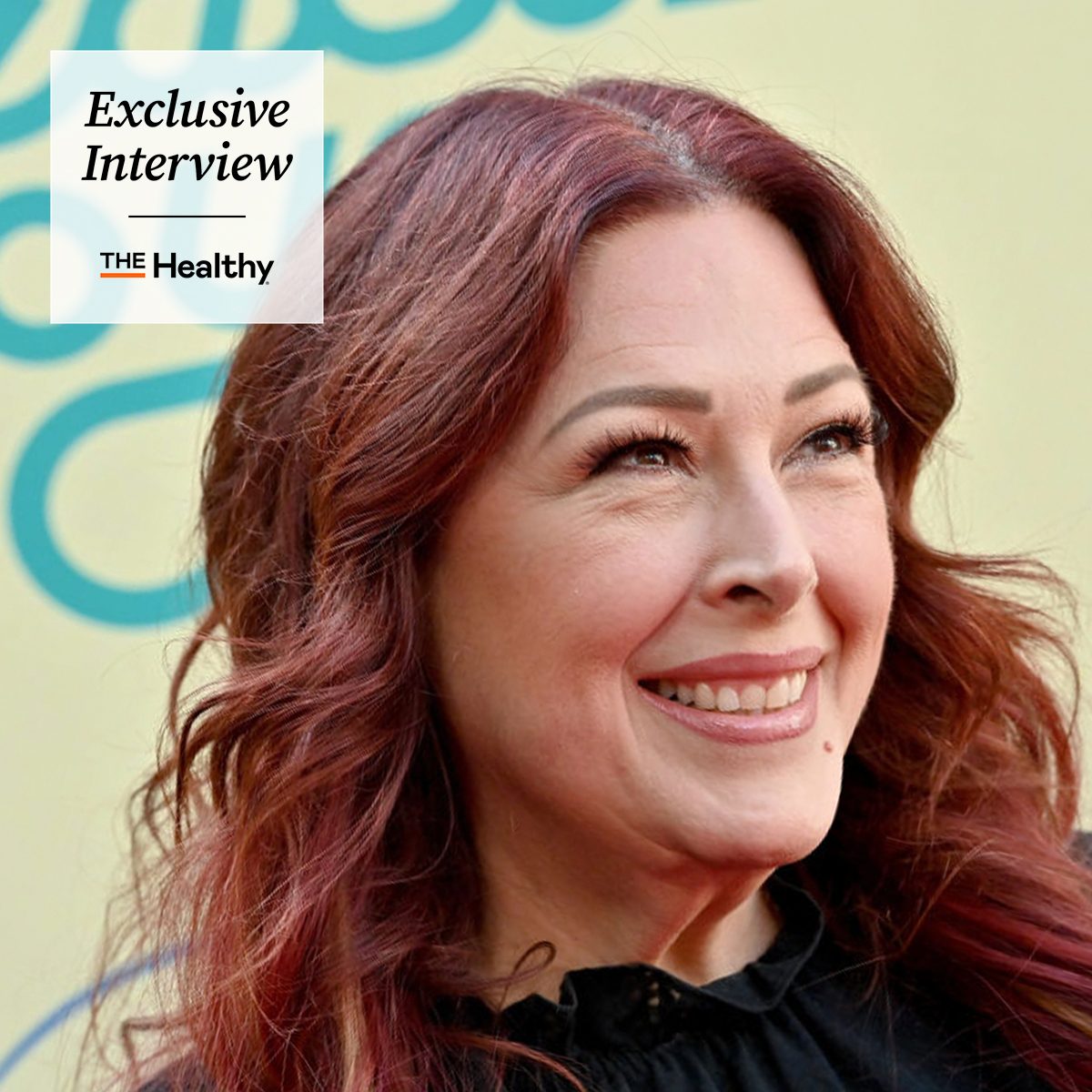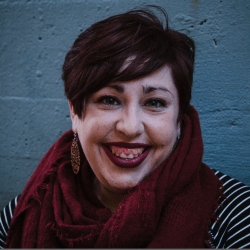The Grammy-nominated singer talks about why she's "giving back" by connecting with people experiencing a certain health condition.

Carnie Wilson Speaks Up on Mental Health: “It’s All About Erasing That Stigma”

Carnie Wilson is no stranger to the spotlight—the singer of the 1990 classic “Hold On” is also the daughter of the Beach Boys’ Brian Wilson—but she’s also aware of the isolation that can happen alongside certain health issues, including mental health.
The 57-year-old has previously opened up about experiencing postpartum depression, addiction, and past suicidal ideations. Now, during Mental Health Awareness Month, she’s sharing more about her own mental health journey, and how she’s reaching out to help others.
Wilson recently spoke with The Healthy by Reader’s Digest about a new partnership with Neurocrine Biosciences, a biopharmaceutical company, in an effort to raise more awareness for a disorder called tardive dyskinesia (TD). People with the condition—which most often develops as a result of taking certain medications, particularly antipsychotics, according to the Cleveland Clinic—experience involuntary movements of the face, body, or limbs. An estimated 800,000 Americans have TD, though up to 60% of those individuals haven’t been officially diagnosed.
Wilson herself does not have tardive dyskinesia, but ahead she shares why she’s passionate about this mission, the reason why mental health isn’t just a trendy topic, and what keeps her grounded.

The Healthy by Reader’s Digest: Carnie, we appreciate that you’ve been open about your health and wellness since before that was a trend. Can you talk about what you’ve gained back from that over the years?
Carnie Wilson: I believe that mental health will never be a trend. I think that taking care of mental health is number one because it affects everything else. I have always been somebody that is very in touch with my feelings and very aware of how I’m feeling. There have been times when I would shut down, and [I] didn’t want to share what I was feeling or what I was going through. That is when I would self-medicate through alcohol and drugs. It added to my depression that I have experienced since I was young, it fueled my anxiety, and I’ve learned over the years how to treat that in a healthier way.
It’s never going to stop—my mental health is something that is ongoing, and it’s important for me to do a checklist every day on how I’m feeling, have I reached out to someone else… I have to take action, and for me that is just connecting with people.
The Healthy: Mental health has become more of a mainstream topic just in the past few years. What’s your take on that?
Carnie Wilson: I think the biggest blessing of COVID is that we are more open to discuss mental health because people were sitting with themselves, they were not distracted, they were sitting in their feelings, they couldn’t go to work, they couldn’t do their daily lives…so they really had to look inward.
I think people did a lot of self-reflecting, a lot of analyzing their lives and the people around them. We were stuck together in rooms and going stir-crazy, but I think it was really important because we’re realizing we have always had people suffering from mental health problems. I think that COVID was a catalyst to be more open.
The Healthy: What inspired you to get involved in this campaign to raise awareness about tardive dyskinesia?
Carnie Wilson: When I learned about tardive dyskinesia, which I don’t have—I realized that I know what it feels like to face shame and stigma. I too am suffering alone, especially when I was living with addiction and feeling really sorry for myself. I didn’t feel any hope at all—I had accomplished so much, and I hit rock bottom where I realized if I don’t open up and reach out for some help, I am not going to be able to carry on. I hit a dark pit.
And people that live with TD, what I’ve learned from talking to advocacy leaders at Mental Health America (MHA), National Alliance on Mental Health (NAMI), and Alliance for Patient Access (AfPA) and what patient ambassadors have told me is that they felt so much shame because they need to be on their medication to help their mental health issues… They need their medication and unfortunately they developed TD. It added fuel to the fire, but what they did share with me is that, no, this is a good story, this is a story of positivity. They were brave enough to say, “I think I have these symptoms,” “I know I have these symptoms,” “Help, what do I do about that.”
So, for me, being able to sit one-on-one with these patients and their care partners and connect with them about TD… And the fact that we are calling it ConnectIng with Carnie is the greatest name ever, because that is exactly what I am doing with them. I am connecting with them, and they are connecting with me, and I’m encouraging people to connect with their own healthcare providers—they need to reach out.
ConnectingWithCarnie.com provides resources for those who think they may be experiencing uncontrollable movements, and their loved ones, to have a productive conversation with their healthcare provider about getting screened and looking into treatment options. So, it is all about empowering, it is all about erasing that stigma that is still there but getting better, and uplifting people to know that they’re not alone. They don’t have to suffer for one more day.
The Healthy: Who is your biggest supporter in your mental health journey?
Carnie Wilson: My children and husband. As a parent you think, “Am I sharing too much with them?” But it’s important for me as a mom that I have admitted my mistakes, I have admitted that I also can feel anxious, and by me admitting it to them, they have admitted it to me. The support I have from my family is unbelievable, but I feel the support all over the place.
It is like I am giving back—I have struggled through my addictions and my mental illness myself, but I couldn’t do it by myself, I needed people around me and so I am almost giving back in a way to say you don’t have to suffer anymore, every day is different, and there’s no perfect anything. We are not here to win an award or reach a certain level, like we’ve run that marathon and crossed the finished line. It is more about I’m coping, I’m managing, I am finding this balance that I have always craved.
I crave balance in my life and I think honestly people that have these movements are so frightened because it is so out of their control, and when they finally get that treatment to feel like they’ve battled it and they have overcome it but they know that is all fragile. It is just about managing, but to see the light in their eye and to see they felt the support and I support them…it is the symbiotic thing.
The Healthy: What’s one self-care habit you refuse to skip?
Carnie Wilson: Prayer—prayer is how I take care of myself. It is not a religious thing; it is that I have to connect to something that is bigger than me. Being spiritual is sort of giving up your power to something else, having faith in something else that can help you because I don’t have it in me to do it by myself. I look at it like sunlight of my own spirit. I am getting a little out there right now, but that is what I do. Prayer is a big part of my self-care—the minute I feel myself retreating or isolating, I go, “Wait a minute, I am reverting back to that habit. What am I afraid of right now? Oh, I am afraid to say I need help about something, and I have to stay in check,” and it works every time.
For daily wellness updates, subscribe to The Healthy by Reader’s Digest newsletter and follow The Healthy on Facebook and Instagram. Keep reading:
- Dwyane Wade Is Redefining What Men’s Health Means
- Gold Medalist Allyson Felix Talks About Motherhood and How She’s Still Using Her Platform
- Audi Crooks on Keeping Eyes on the Prize and Caring for Mental Health
- The Women’s Health Topic Hoda Kotb Is Keeping “Front and Center”
This interview has been edited for length and clarity.
